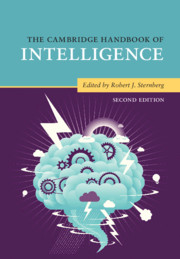Book contents
- The Cambridge Handbook of Intelligence
- The Cambridge Handbook of Intelligence
- Copyright page
- Dedication
- Contents
- Figures
- Tables
- Contributors
- Preface
- Part I Intelligence and Its Measurement
- Part II Development of Intelligence
- Part III Intelligence and Group Differences
- Part IV Biology of Intelligence
- Part V Intelligence and Information Processing
- Part VI Kinds of Intelligence
- Part VII Intelligence and Its Role in Society
- Part VIII Intelligence and Allied Constructs
- Part IX Folk Conceptions of Intelligence
- 49 Self- and Other-Estimates of Intelligence
- Part X Conclusion
- Author Index
- Subject Index
- References
49 - Self- and Other-Estimates of Intelligence
from Part IX - Folk Conceptions of Intelligence
Published online by Cambridge University Press: 13 December 2019
- The Cambridge Handbook of Intelligence
- The Cambridge Handbook of Intelligence
- Copyright page
- Dedication
- Contents
- Figures
- Tables
- Contributors
- Preface
- Part I Intelligence and Its Measurement
- Part II Development of Intelligence
- Part III Intelligence and Group Differences
- Part IV Biology of Intelligence
- Part V Intelligence and Information Processing
- Part VI Kinds of Intelligence
- Part VII Intelligence and Its Role in Society
- Part VIII Intelligence and Allied Constructs
- Part IX Folk Conceptions of Intelligence
- 49 Self- and Other-Estimates of Intelligence
- Part X Conclusion
- Author Index
- Subject Index
- References
Summary
It is a widely held view that “nobody knows you better than yourself.” However, the low validity of self-estimates of intelligence and other abilities indicated by a considerable body of research does not support this notion. Individuals overestimate themselves and do so particularly for domains in which they perform poorly (the so-called Dunning-Kruger effect). Interestingly, intelligence estimates given by others are equally accurate or sometimes even more accurate than self-estimates. This chapter provides an overview of research on self- and other-estimates of intelligence and potential moderators of their accuracy. It also aims to bring the research lines on self- and other-estimates of intelligence together within the framework of the self-other knowledge asymmetry (SOKA) model proposed by Simine Vazire. The ability to predict for which intelligence subfactors one of the two perspectives might provide more accurate estimates has implications for both research and practical fields like vocational counseling.
Keywords
- Type
- Chapter
- Information
- The Cambridge Handbook of Intelligence , pp. 1179 - 1200Publisher: Cambridge University PressPrint publication year: 2020
References
- 1
- Cited by

